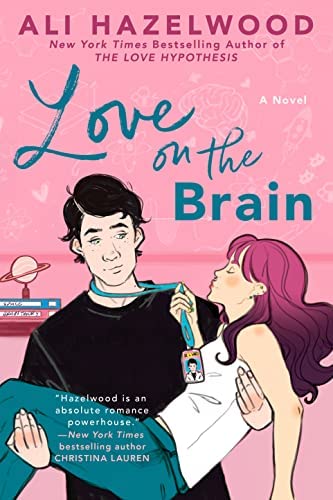“Love on the Brain” is light-hearted and entertaining for the holiday season
While it may sound like a familiar story, the text does have its own fun quirks

“Love on the Brain” is by author Ali Hazelwood, a NYTimes bestselling author
December 6, 2022
Ali Hazelwood’s “Love on the Brain” is a cute science-filled rom-com that gives the reader two lovable characters, one of whom is a woman in STEM (Science, Technology, Engineering and Math), a fairy-tale ending. From the Marie Curie bits from the references to “You’ve Got Mail” and “Star Wars,” the rom-com is sure to give a laugh to the audience and also make the reader feel for the main character.
Dr. Bee Königswasser has been offered to co-lead a neuroengineering project at NASA. It’s her dream until she realizes her co-leader is Levi Ward, her nemesis from the University of Pittsburgh. From computer delays to email mishaps, everything seems to be going wrong for Bee. But surprisingly, Levi was helping her. Bee always had thought he despised her… but maybe it was quite the opposite.
“Love on the Brain” is the new work that came out in late August from the famous “Booktok” author, Ali Hazelwood, widely known for writing “The Love Hypothesis.” The author is known for her books which often feature strong female protagonists in STEM.
“The Love Hypothesis” has received rave reviews from many readers, such as students from RV.
“I found the book like a roller coaster, I had ideas of what was going to happen, and I still continued to read,” said freshmen Lily Daniel. “The author has such an amazing form of writing, it’s so enhancing.”
The new work from The New York Times bestselling author is definitely reminiscent of “The Love Hypothesis;” the book brings a humorous plot line along with a dynamic female protagonist and male love interest, and also manages to throw in great secondary characters that just make the story well-rounded just like “The Love Hypothesis.”
Personally, I loved the book and thought it was a great read. The references that were already mentioned were such cute additions to the book and made it more enjoyable. The strong female leads in her books just make the books all that better. The secondary characters, such as Rocío and Kaylee, were a highlight of the book too. Rocío at the end of the book had tied (with Bee) for my favorite character due to her eccentric personality that acted as the comic relief for the book. Kaylee and Rocío were polar opposites, but their relationship dynamic was very interesting.
I also liked that the struggles of both Bee and Levi were seen in the novel and the book didn’t solely focus on romance. Levi’s struggles with his family’s invalidation of his career along with Bee’s struggles as a woman in STEM just added to the dimension of the novel.
However, there were problems that I had with the book. At times it does, I have to admit, feel too much like “The Love Hypothesis.” While it is the “enemies to lovers” trope and not the “fake dating” trope as in “The Love Hypothesis,” Levi and Adam (male love interest of “The Love Hypothesis”) have many similarities. Bee and Olive (female protagonist of “The Love Hypothesis”) were very similar at times as well, like Levi and Adam.
Kirkus Reviews comments draws this parallel in its review of “Love on the Brain,” “While Hazelwood is clearly a talented writer who’s tapped into readers’ desire to find powerful, proudly nerdy women in science getting happy-ever-afters, she’s missed the opportunity to try new character types that don’t feel like ‘The Love Hypothesis’ (2021) with slightly different packaging.”
I also didn’t like the miscommunication trope, but it was understandable because of the need for conflict. Just as forewarning, this book contains some mature content and language; if you are uncomfortable with this I wouldn’t recommend reading the book.
As a whole, “Love on the Brain” is a great read. It provides important representation for women while also being a light-hearted rom-com, making it a great light read for any romance lover out there. There are similarities between “Love on the Brain” and “The Love Hypothesis,” but if it’s not a big deal for you, I would recommend it at the rating of 7/10.





